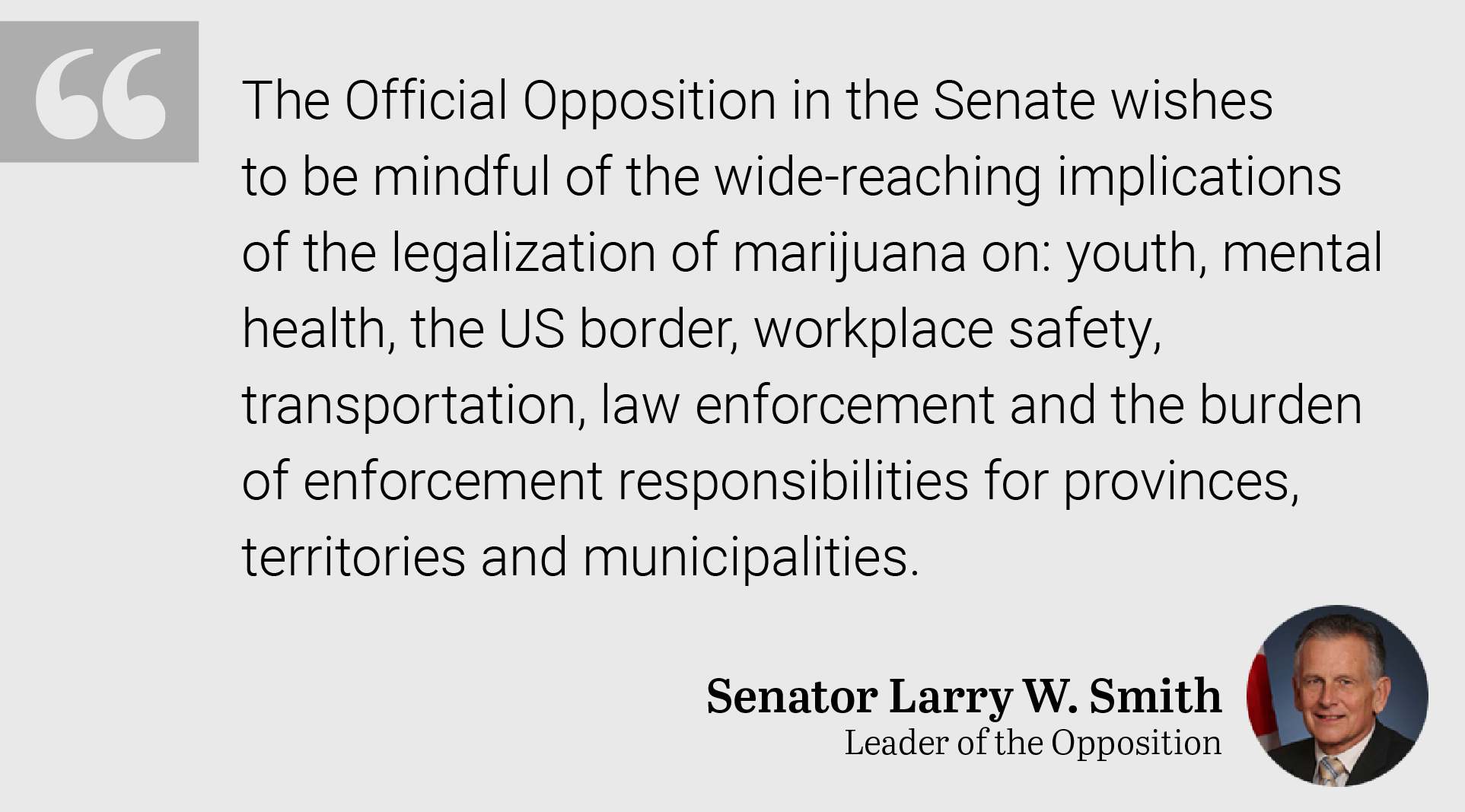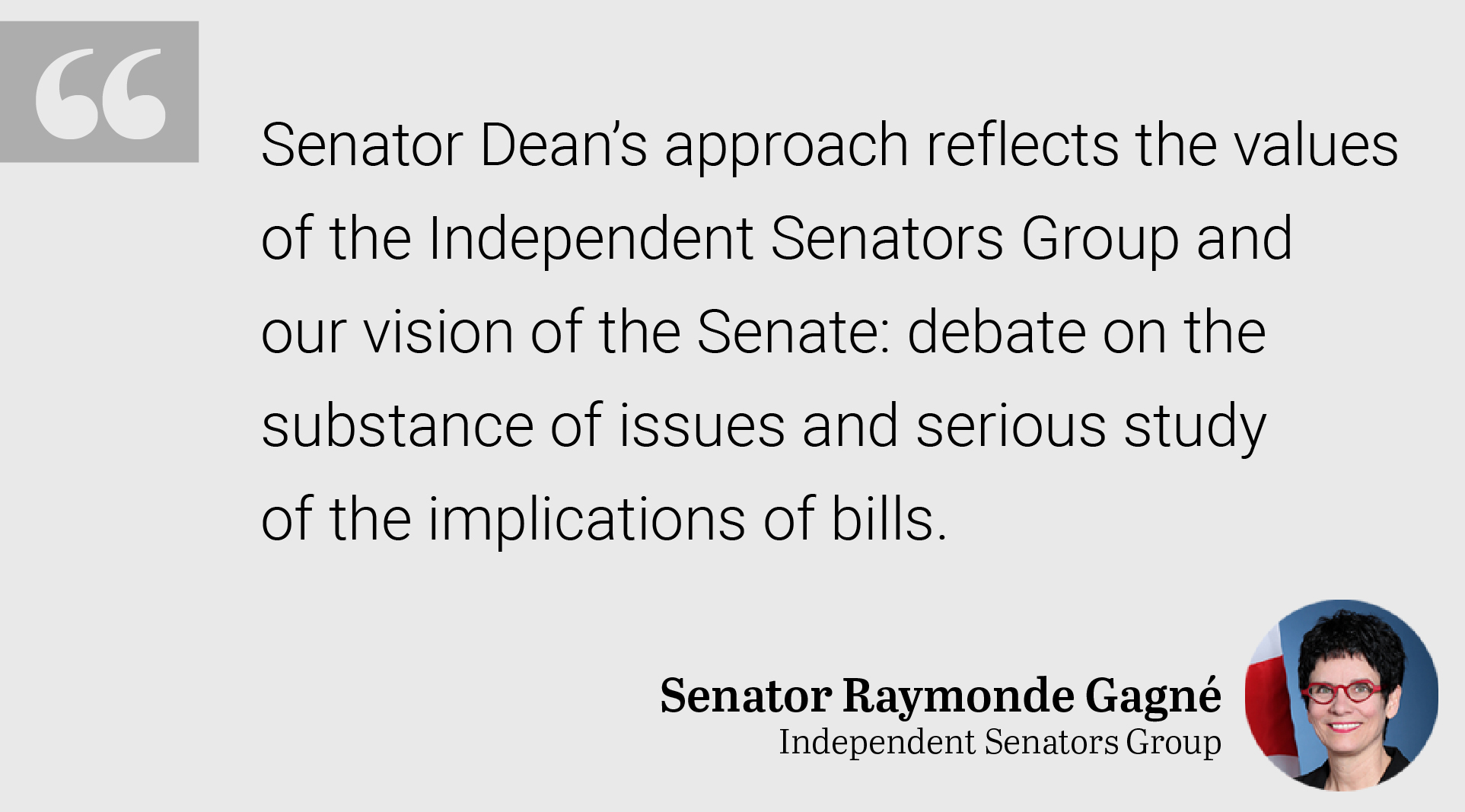Perspectives - January 30 - February 1, 2018

Last week at the Senate: the national anthem bill passes, debate on cannabis legislation continues and two senators retire.

Government
This past week, the Senate voted to pass Bill C-210. The bill, which was introduced in the House of Commons two years ago by the late Mauril Bélanger M.P. in January 2016, proposes changing two words in ‘O Canada’ to make the English version of our national anthem gender-neutral.
Bill C-210 proposes that “True patriot love in all thy sons command” become “True patriot love in all of us command”. By changing “thy sons” to “of us” in our national anthem, we honour the contribution and sacrifice of all Canadians.
Bill C-210 was passed by the House of Commons on June 15th, 2016, by a vote of 225 to 74, and the proposed legislation was sent to the Senate for consideration. Later that same day, Senator Nancy Ruth introduced the bill in the Senate, and debate on Second Reading began on June 21st, 2016.
After 19 months of debate, including an examination of the bill by the Senate Committee on Social Affairs, Science and Technology, C-210 was finally passed and will soon receive Royal Assent. Senator Frances Lankin, who sponsored the legislation in the Senate following the retirement of Senator Nancy Ruth, deserves full credit for her tireless efforts toward ensuring C-210 became law.
It is heartwarming to know that Canada’s athletes competing at the PyeongChang 2018 Olympic Winter Games will be able to hear and sing their national anthem with lyrics that include all Canadians, regardless of gender. This is something all of us can be proud of!

Opposition
Senate begins the review of Bill C-45 (legalization of marijuana) and Bill C-46 (impaired driving). The Official Opposition in the Senate wishes to be mindful of the wide-reaching implications of the legalization of marijuana on: youth, mental health, the US border, workplace safety, transportation, law enforcement and the burden of enforcement responsibilities for provinces, territories and municipalities.
This week, Senator Victor Oh hosted a panel on the health implications of the use of cannabis. The Senator stressed the importance of examinations, in particular on the significant impact on the health of children and youth in Canada. He stressed the need to take serious caution, rather than an impulsive approach to avoid unintended consequences.
Doctors Michael Reider and Christina Grant appeared as witnesses on the panel to raise their concerns with the legislation. Dr. Reider commented on the legal age of consumption from a scientist’s perspective, arguing that it should be 25 years.
Dr. Grant argued that because young people’s brains continue to develop into their mid-20s, legislators should be cautioned of the long-lasting life effects of early use of cannabis.
Dr. Reider raised concern with the provisions related to personal plant cultivation at home, in particular for parents with young children. On this matter, we should note that the Canadian Association of Chiefs of Police strongly recommends against in-home production and that any provisions related to personal cultivation be removed.
As Parliamentarians, we have a responsibility to protect Canada’s youth.
Thank you to Senator Oh for hosting this panel.

Senate Liberals
This week, we were saddened to mark the retirement of two exceptional female Parliamentarians, Senator Joan Fraser and Senator Claudette Tardif.
Joan Fraser was a renowned journalist in her previous career, and her interest in serious public policy issues found a new home when she arrived in the Senate. Over the years she chaired some of our most prestigious committees, including the Senate Committee on Legal and Constitutional Affairs, the Senate Committee on Transport and Communications, and the special committee on the “Clarity Bill.” She was also chair of the Senate Committee on Rules, Procedures and the Rights of Parliament where her attention to detail — her editor’s eye — served her extremely well. There can be no argument that her knowledge of our Rules and procedures is second to none.
Claudette Tardif’s extraordinary career, both as educator and senator, has been a story of commitment and achievement. She is known as a staunch defender of the cultural and linguistic rights of francophone minorities in Canada, particularly in her home province of Alberta. She was the chair and vice-chair of the Canada-France Inter-Parliamentary Association, and also chaired the Senate Committee on Official Languages for many years, reporting on various subjects, including CBC/Radio-Canada’s language obligations and increasing bilingualism among young Canadians.
Coincidentally, both these formidable women served as deputy leader of our Liberal caucus, providing wise guidance and strong support to their colleagues.
The Senate, and all Canadians, benefitted from Senator Tardif’s and Senator Fraser’s work in Parliament. Their leadership, integrity and dedication will be sorely missed.

Independent Senators Group
Since Bill C‑45 was introduced in the House of Commons last April, the legalization of cannabis products has provoked a variety of reactions. The House of Commons passed Bill C‑45 in November 2017, and its sponsor in the Senate, Senator Tony Dean, outlined the main features of the bill a few days later.
When we left Parliament Hill for the holidays, we knew that an important issue would be waiting for us when we returned this week.
The Senate debate on Bill C‑45 is now well underway and is fully transparent. As its sponsor, Senator Dean decided to make information about the bill available to all Senators interested in the issue, regardless of their position on the bill.
Senator Dean’s approach reflects the values of the Independent Senators Group and our vision of the Senate: debate on the substance of issues and serious study of the implications of bills. Accordingly, senators André Pratte and Marc Gold were able to explain the need for urgent action using supporting evidence. While I support Bill C-45 and its objectives, I rose in the Senate to express my concerns about the proposed taxation scheme and the role taxes can play to deter the consumption of a substance that is nonetheless harmful, particularly for children.
The debate will continue next week, when various ministers will appear before the Senate.
At the same time, the Senate Committee on Aboriginal Peoples will begin its own study on the impact cannabis legalization would have on First Nations, Inuit and Métis communities.
In short, the Senate has begun its work, and the legalization of cannabis products will be subject to sober—and comprehensive—second thought.


